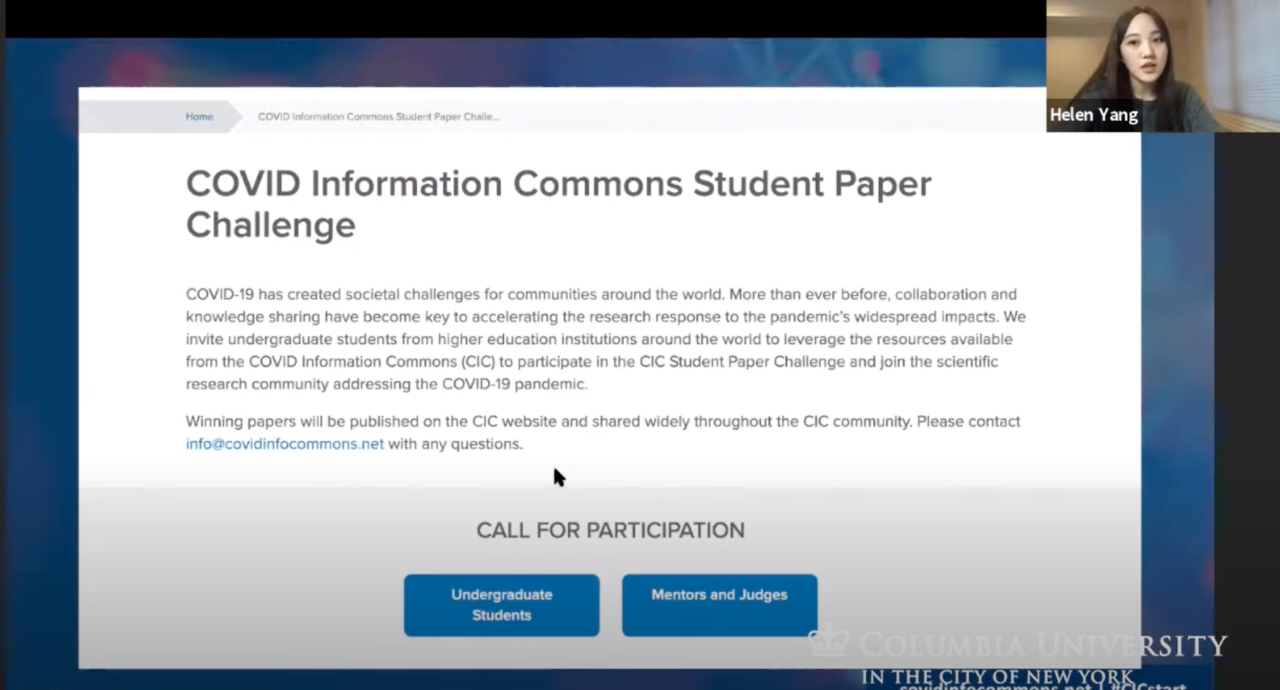
Over 80 people convened for this month’s COVID webinar, as six NSF Rapid Response Research investigators from across the United States shared their research topics and findings regarding the COVID-19 pandemic, and the new COVID Information Commons Student Paper Challenge was announced.
This month’s presenters included Foad Hamidi (University of Maryland Baltimore County), Aron Laszka (University of Houston), Guan Saw (Claremont Graduate University), Gloria Oporto (University of West Virginia), Janet Williams (University of Idaho), and John Yin (University of Wisconsin Madison). The range of the PIs’ research is noteworthy, as they not only addressed important societal issues linked to COVID-19, but also posed applicable solutions in their findings.
During COVID, the internet is more essential than ever for people to stay connected with the wider world. Through installing routers in homes and setting up antennas at optimal user location points, Foad Hamidi uses an effective community-based approach to set up free high-speed internet access in urban settings. In response to the increase in healthcare associated infections in hospitals and the various limitations of current PPE, Gloria Oporto’s research aims to create a reusable nanoporous biofilter that removes 99.999% of airborne particles and has antimicrobial properties. Consistent with previous studies, SARS-CoV-2 was not detected in mothers’ milk in Janet Williams’s study, which, in turn, has helped change CDC’s recommendations for breastfeeding during the pandemic. As two of his coworkers joined in on the webinar, Professor of Chemical and Biological Engineering at the University of Wisconsin Madison John Yin explained the practice of dialing the virus up or down. Good for anti-viral testing, fluid-flows can enhance the spread of the virus— or dial it up—while defective interfering particles that prey on virus infections can reduce its spread—what’s known as dialing it down.
Every investigator shared their email at the end of the call to continue the discussion and answer lingering questions, and a few included additional links to more details on their ongoing research. PI Aron Laszka is working to overcome the new resource and data challenges of public transit services in today’s pandemic that affect low-income neighborhoods that rely on the affordability and availability of public transportation. As requested by an attendee, Aron shared a link to his full data that you can access here. On the call with his co-investigator Nick Chang from University of Kansas, PI Guan Saw shared his research on how effective e-mentoring can be – given that students, especially those who are women, of low socioeconomic status, disabled, and/or international are more likely to experience delayed graduation, have less confidence finding a suitable job, and have heightened depression and anxiety since the spike of the pandemic. After their presentation, Chang shared a link to their brief report, as well as a report on Gender Disparities in Remote Learning during COVID-19 pandemic.
To end the webinar, Northeast BIg Data Innovation Hub member and Columbia undergraduate Helen Yang announced our newest community initiative, the COVID Information Commons Student Paper Challenge. Developed by Helen herself, the Student Paper Challenge inspires students to learn about the diverse and innovative ways researchers have addressed COVID’s impact on society, and create their own insights on the next steps for COVID research. Undergraduate students from around the world are invited to harness resources from the COVID Information Commons and participate in the challenge for a chance to get their paper published on the CIC website. The announcement was met with collective excitement, as one attendee even commented, “ Completely awesome way to get students involved!”
- The student participation form is due February 1, 2021 at 11:59 PM ET
- The mentor participation form is due January 8, 2021 at 11:59 PM ET
- The judge participation form is due March 15, 2021 at 11:59 PM ET.
The next CIC lightning talks and Q&A webinar will be held on Wednesday, January 13, 2021, 12:00 – 1:00 PM ET. Featured researchers will present on the decentralization of work spaces to reduce joint hazards, the security and safety of food supply chains, the cellular interaction between SARS-CoV-2 and the lungs, and more. Register for the January webinar, sign up for the CIC mailing list, and join the CIC Slack channel for updates on upcoming events and opportunities to engage with the COVID Information Commons community.
